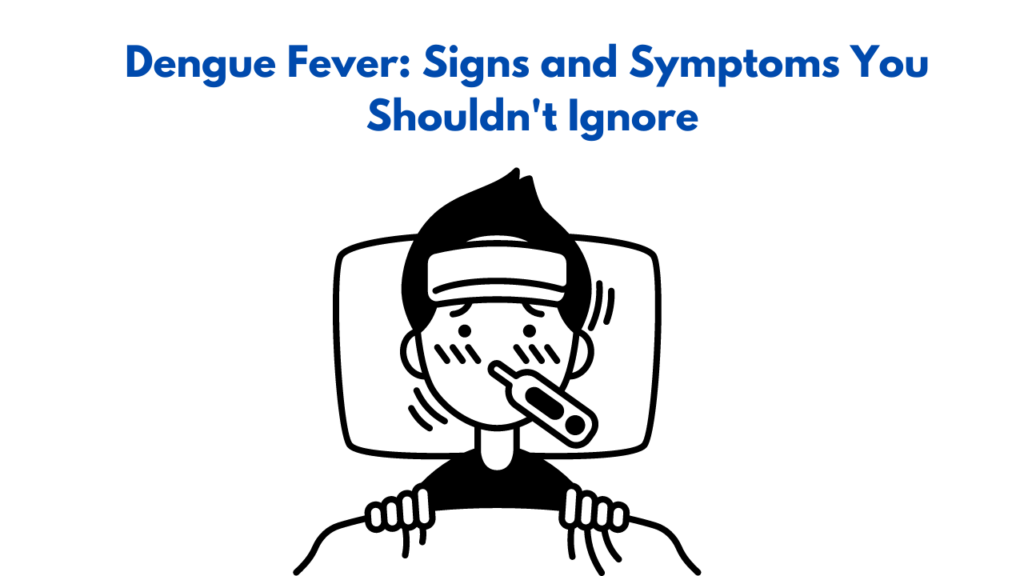
Dengue fever is a viral disease spread primarily by Aedes mosquitoes, especially Aedes aegypti. It is prevalent in tropical and subtropical climates, affecting millions of people each year. Understanding the signs and symptoms of dengue fever is important for early detection and treatment.
What Causes Dengue Fever? 🤔
Dengue is caused by dengue virus, which has four different serotypes. Infection with one serotype provides immunity to that specific type but does not protect against others. This means that a person can suffer from dengue several times in their lifetime.
Common Symptoms 🏥
Dengue fever usually appears 4 to 10 days after being bitten by an infected mosquito. Symptoms can vary in severity and may include:
1. Fever 🌡️:
- Sudden onset of a high fever, often between 100.4°F (38°C) and 104°F (40°C).
2. Headaches 🤕:
- Moderate to severe headaches that can be quite uncomfortable.
3. Muscle and Joint Pain 💪😣:
- Pain in muscles and joints, often described as feeling achy or sore. This is why dengue is sometimes referred to as “breakbone fever.”
4. Fatigue 😴:
- A general feeling of tiredness and weakness, which can linger even after other symptoms improve.
5. Nausea and Vomiting 🤢:
- Some individuals may experience nausea and occasional vomiting.
6. Skin Rash 🌼:
- A rash may appear a few days after the fever begins, which can vary in appearance.
7. Mild Bleeding 🩸:
- This can include slight bleeding from the nose or gums, as well as easy bruising, though it’s not usually severe.
Duration and Monitoring ⏳
These mild symptoms usually last for about a week. Although they may be uncomfortable, most people recover completely without the need for hospitalization. However, it is essential to monitor symptoms closely, as mild dengue can sometimes develop into more severe forms.
Severe Dengue ⚠️
In some cases, dengue can develop into more serious forms, such as dengue hemorrhagic fever or dengue shock syndrome. These conditions can be life threatening and require immediate medical attention. Symptoms of severe dengue may include:
Severe Abdominal Pain 🤕:
Intense and persistent pain in the abdomen, which may indicate internal bleeding.Persistent Vomiting 🤢:
Continuous vomiting that prevents the person from retaining fluids, leading to dehydration.Rapid Breathing 😮💨:
Difficulty breathing or an increase in respiratory rate, which can signify shock.Bleeding 🩸:
Signs of bleeding can include:- Nosebleeds 🤧
- Bleeding gums 🦷
- Unexplained bruising or petechiae (small red spots on the skin) 🩹
- Blood in urine or stool 🚽
Fatigue or Restlessness 😴😟:
A significant feeling of tiredness and an inability to stay still can indicate a worsening condition.Plasma Leakage 📉:
This may lead to a drop in blood pressure, which is a critical sign of severe dengue.Organ Impairment ⚠️:
Severe dengue can affect various organs, leading to complications such as liver dysfunction or respiratory distress.
FAQ About Dengue Fever
1. What is dengue fever?
Dengue fever is a viral illness transmitted by mosquitoes, mainly the Aedes aegypti species. It is caused by the dengue virus and is prevalent in tropical and subtropical regions.
2. What are the typical symptoms of dengue fever?
Dengue fever commonly presents with high fever, intense headaches, pain behind the eyes, joint and muscle discomfort, nausea, vomiting, fatigue, skin rash, and mild bleeding tendencies.
3. How does dengue fever spread?
The dengue virus spreads through the bite of infected Aedes mosquitoes. These mosquitoes are most active during the daytime, particularly in the early morning and late afternoon.
4. How long does dengue fever typically last?
Mild symptoms of dengue fever generally persist for about 5 to 7 days. Most individuals make a full recovery within a week.
5. Is it possible to contract dengue fever multiple times?
Yes, individuals can be infected with dengue fever multiple times because there are four distinct serotypes of the dengue virus. Immunity to one serotype does not protect against the others.
6. What should I do if I suspect I have dengue fever?
If you think you have dengue fever, it is crucial to stay hydrated, rest, and seek medical advice. Keep a close eye on your symptoms for any signs of worsening.
7. How can I prevent dengue fever?
To prevent dengue, take measures such as removing standing water from your surroundings, using insect repellent, wearing long-sleeved clothing, and sleeping under mosquito nets.
8. Is there a vaccine available for dengue fever?
Yes, there is a vaccine known as Dengvaxia, which is recommended for those who have previously had dengue. Consult your healthcare provider for specific recommendations based on your health history and local guidelines.
9. What are the severe forms of dengue fever?
Severe dengue includes conditions like dengue hemorrhagic fever and dengue shock syndrome, which can be life-threatening. Symptoms may involve intense abdominal pain, ongoing vomiting, rapid breathing, and bleeding.
10. When should I seek medical help?
It’s essential to seek medical attention if you experience severe abdominal pain, persistent vomiting, unusual bleeding, or signs of shock. Early intervention is key to improving outcomes.
Conclusion
Severe dengue is a serious condition that can develop from a dengue virus infection. Recognizing the symptoms early—like severe abdominal pain, persistent vomiting, rapid breathing, and signs of bleeding—is crucial. If you or someone you know experiences these symptoms, it’s important to seek medical help right away. Timely treatment can make a significant difference in recovery. Staying informed and taking preventive measures against mosquito bites can help reduce the risk of dengue and its severe forms.
